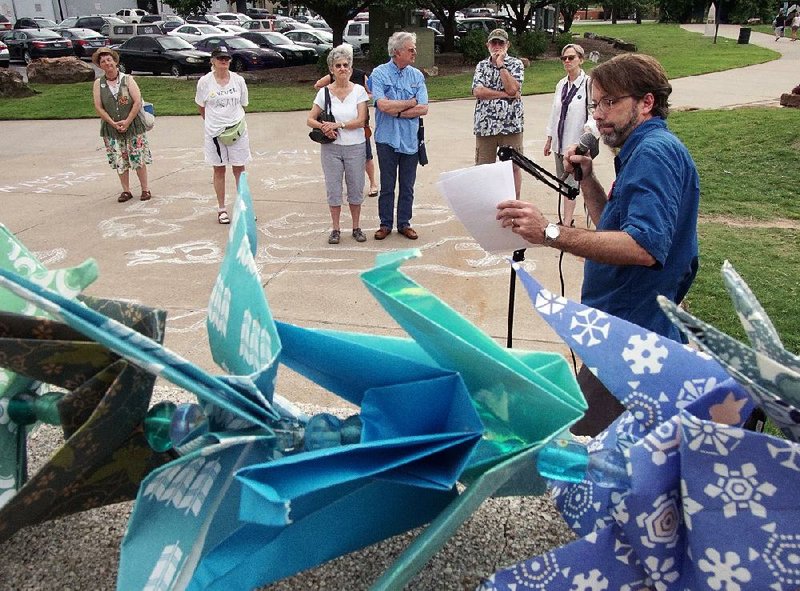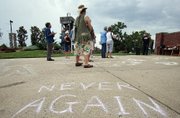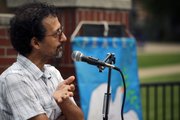Outlines of bodies were chalked on the sidewalk, as if marking the scene of a crime that had unfolded beside the Junction Bridge in Little Rock.
RELATED ARTICLE
http://www.arkansas…">Japan renews call for nuke-free world
The figures were a part of a commemoration of the World War II atomic bombings of Hiroshima and Nagasaki that the Arkansas Coalition for Peace and Justice organized Saturday on the 71st anniversary of the Hiroshima bombing.
"It is a crime scene. It's the biggest crime scene," said Anncha Briggs, one of seven speakers at the event at Riverfront Park. She spoke about the aftermath of the 1945 bombings of Japan.
About 150,000 people in Hiroshima and 75,000 in Nagasaki were killed or wounded by the two atomic bombs, according to research from the University of California at Los Angeles.
Many were crushed in their homes or work buildings, while some walked away from the destruction after the detonations and died. Others died weeks later from burns, internal injuries and radiation poisoning, according to the research.
Michael Vaughn, founder of the Arkansas chapter of the nonprofit Veterans for Peace, said the United States needs to spearhead a movement toward nuclear disarmament.
He said he went into the military when he was 24 because he wanted to help protect his country, but he found that the threat to the U.S. was minimal.
"My experience has shown me that the people we were fighting were not trying to come out here," he said.
Vaughn was on an intelligence-gathering team in the Iraqi war, and he said none of the military's targets on whom he gathered information were trying to get the U.S.
His experiences in the military prompted him to start the Arkansas chapter of Veterans for Peace.
"We hope that our voices and our experiences can cut through the dismissive rhetoric toward peace groups," Vaughn said.
He said U.S. voters should carefully consider the power of the president to start a nuclear war when electing the next commander in chief in November.
"Your vote is probably the most powerful tool," he said.
Vaughn also said he thinks the U.S. has more nuclear weapons than are necessary to use in any war, and that it should lead the disarmament efforts by starting to get rid of weapons without asking for reciprocation from other countries.
The United States has 7,100 nuclear warheads, and Russia has 7,300, according to data from the Arms Control Association, a group dedicated to promoting public understanding of and support for arms control policies.
France, Israel, Pakistan, India, China, North Korea and the United Kingdom all have nuclear warheads as well, according to the Arms Control Association website.
This is at least the 10th year for the Little Rock event, said Bob Estes, an officer in the Arkansas Coalition for Peace and Justice.
About a dozen people attended the commemoration, and Estes said that is the average for the event.
The coalition's next goal is to organize a Peace Week from Sept. 18-25. The United Nations' International Day of Peace is Sept. 21, and Estes said the coalition is trying to get different groups to contribute by working together to have events during Peace Week.
At the end of the ceremony, one woman with a violin stood before the crowd, playing "Ashokan Farewell" -- a waltz most famous as the theme to Ken Burns' The Civil War -- as the group stood silently.
As the music ended, rain started to fall. The small crowd scattered toward their dry cars, and the chalk outlines started to fade.
Metro on 08/07/2016


